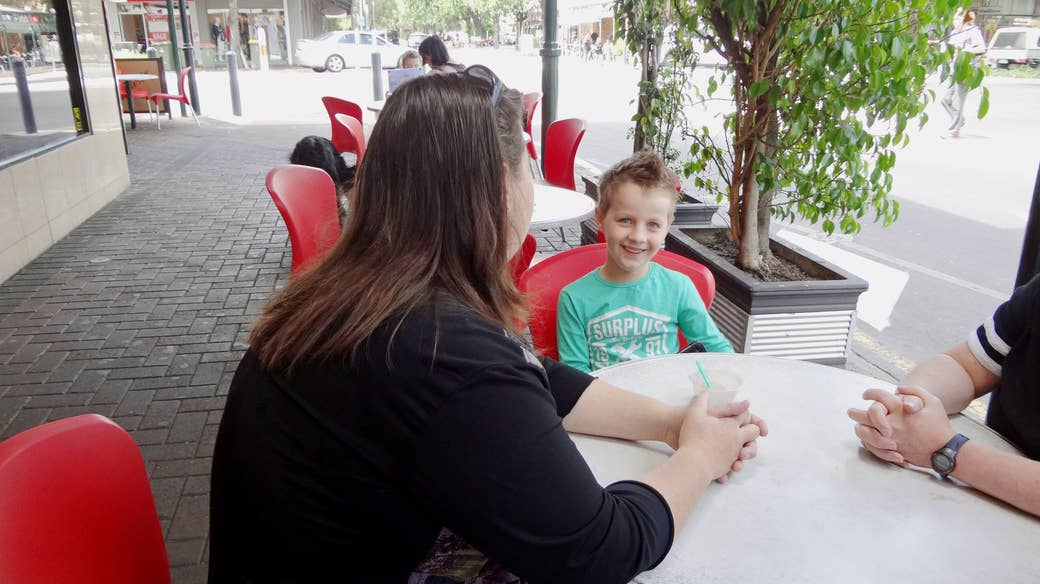
Eli Taylor wants to be a soccer star.
He’s pretty happy with life on this sunny Saturday morning, armed with a single scoop of rainbow ice cream and sandwiched between his two mums outside a bustling Italian cafe.
He’ll join a local Adelaide team soon, Eli tells me, but the dream is to join Chelsea FC one day. It’s a grand objective for a six-year-old, and he delivers it with a cheeky grin.
Eli’s sister Jasmine, 11, sits across from him. She opts for a milkshake instead, and studiously plays on an iPad while her mums, Katherine and Sharon, talk. She interjects occasionally, screwing up her nose when they mention homework.
The Taylors have a happy home in Norwood, Adelaide's east, complete with two mums, two kids, three cats, and a dog. Katherine and Sharon are public servants, Eli and Jasmine go to school. There’s Little Athletics on Sundays, and the weekly whirlwind of pick-ups, drop-offs, homework, and meals. In every respect, they are an ordinary family. But due to a quirk of South Australian law, Eli can have both his mums on his birth certificate, while Jasmine can only have Sharon.
Norwood is the same suburb where Don Dunstan, the former premier of South Australia, grew old with his partner Steven Cheng. It was 40 years ago that South Australia became the first state in the country to decriminalise sex between men, with Dunstan at the helm. But since that initial great leap forward, the state has fallen behind.
In particular, South Australia stands out when you look at same-sex parenting. It's possible to have kids if you're a same-sex couple in the state – but there are bureaucratic barriers at every turn. If a Victorian bill receives the expected stamp of approval in mid-December, South Australia will be one of three jurisdictions in the country that doesn’t allow same-sex adoption. Singles can’t adopt either, or same-sex stepparents. A bill allowing same-sex couples to access altruistic surrogacy in South Australia has been passed, but not enacted, so the practice remains illegal.
These barriers alone put the state in the “behind” category, not to mention wiping out in-state opportunities for gay male couples to have kids. However, two anomalies of South Australian law throw difficulties into the paths of lesbian couples in particular. The first requires proof of medical infertility – as opposed to the "social infertility" of same-sex couples – in order to access IVF and other forms of artificial reproductive technology.
The second – the law that leaves Jasmine with only one legal parent – dictates that lesbian couples who have a child using donor sperm can only have both their names on the birth certificate if they lived together for three of the four years prior to conception. This law captures a small number of families. But the frustration this small group feels at not being legally recognised as a family is palpable.
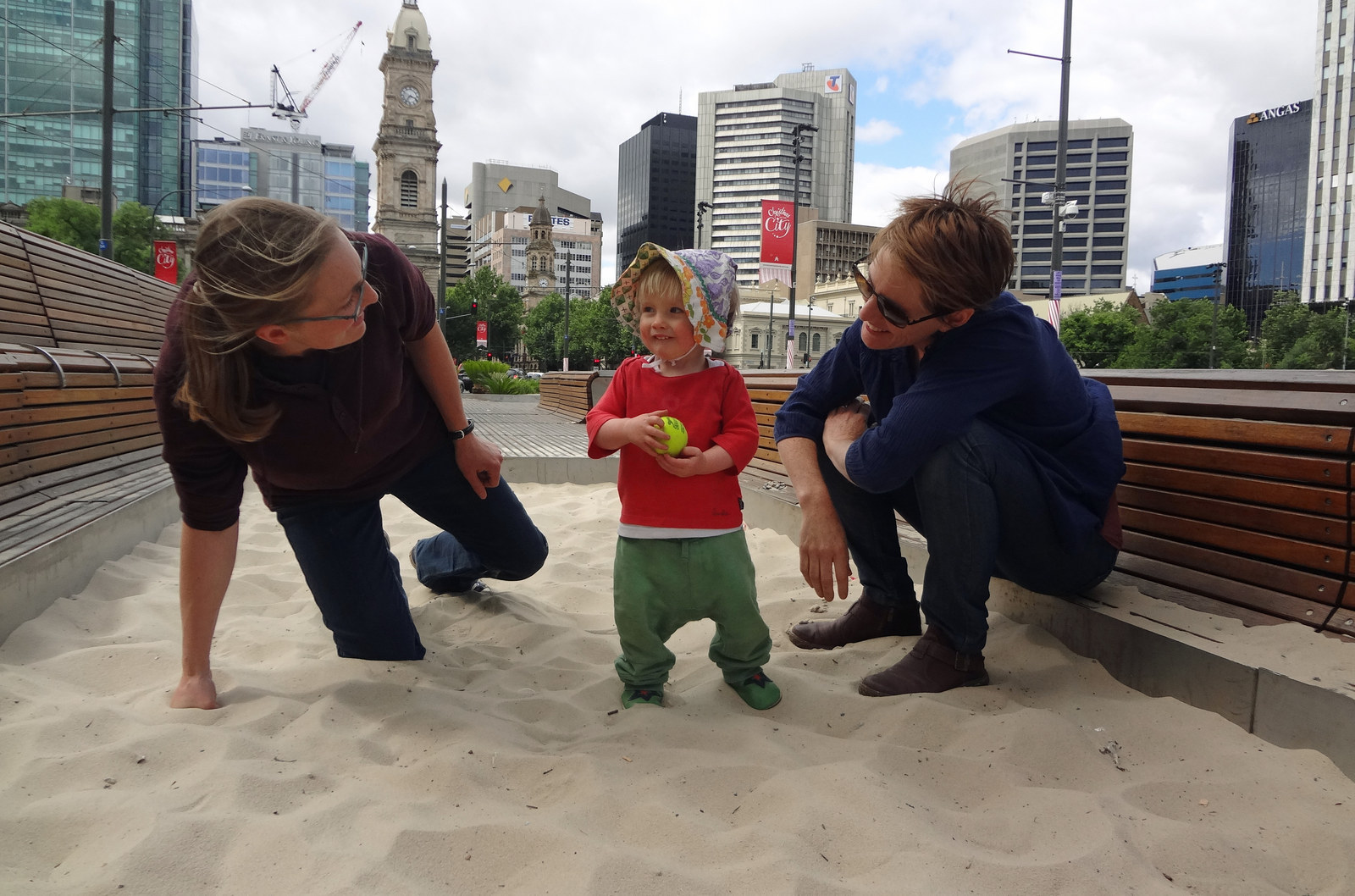
Elise Duffield, Sally Amazon and their 18-month-old son Tadgh make up one such family. For all practical purposes, and according to the federal government, Tadgh has two mums. But legally in South Australia, he has just one.
The law as it currently stands “doesn’t put the rights of the child first,” Sally tells BuzzFeed News. When they applied to have Sally’s name placed on Tadgh’s birth certificate and got a rejection letter from Births, Deaths and Marriages (BDM) because they hadn’t lived together for long enough, just accepting it lying down wasn’t an option.
"I think at that point, most people would have gone ‘Oh well, we’ll just get one name on the birth certificate and live with it’," says Elise. "We just went, ‘No, you have to change the law!’"
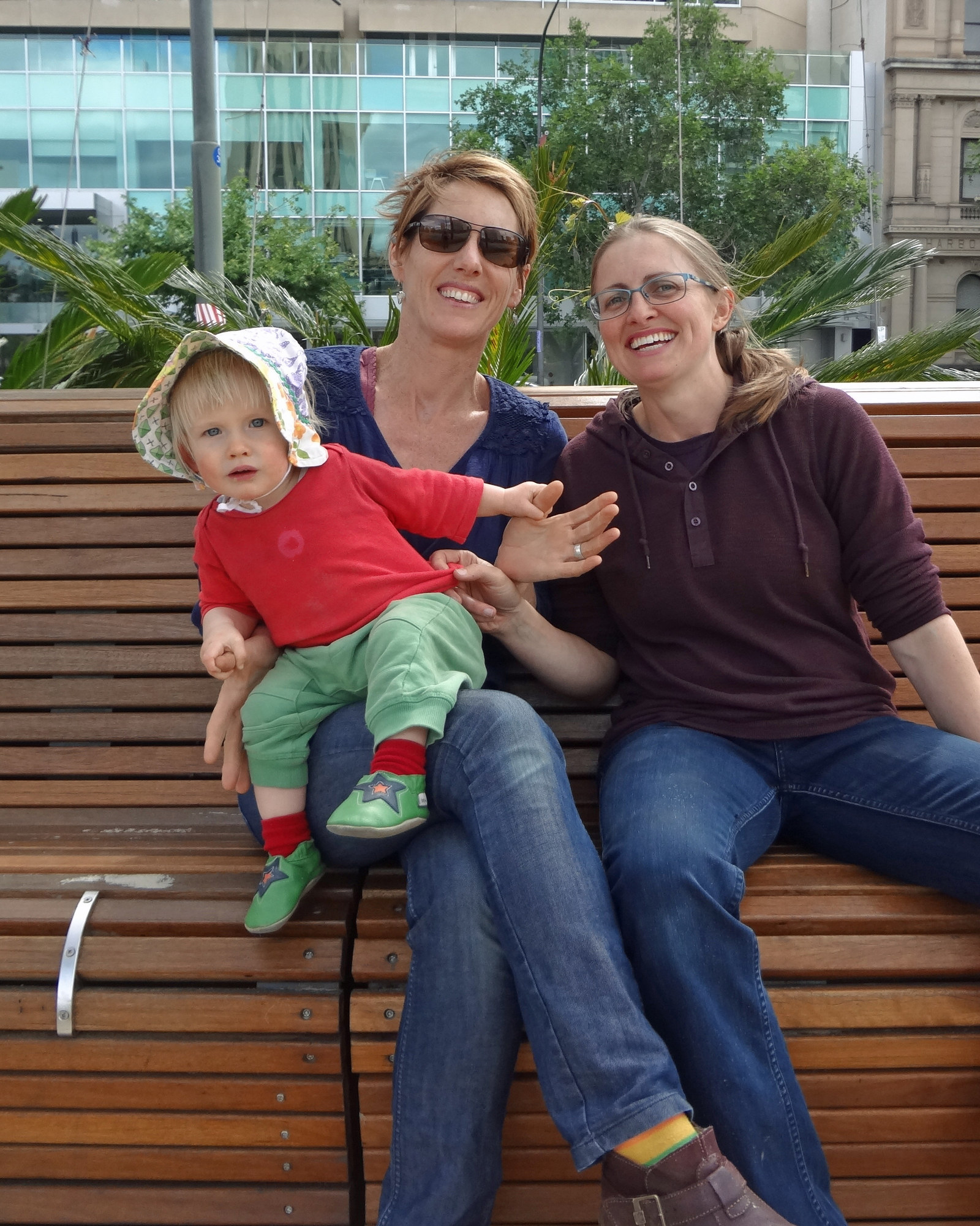
Tadgh is playing in a sandpit in Adelaide’s central Victoria Square, where, later in the afternoon, hundreds will gather for the annual Adelaide pride parade. He’s adventurous, and surprisingly speedy; his mums take turns chasing down his regular breaks for freedom as they chat to BuzzFeed News.
After doing some research, Elise and Sally discovered that technically the law did apply to heterosexual couples as well – they were just less likely to have conceived using methods other than sex, and if a man and woman appeared on the form, they were never questioned.
They took the information to authorities in the hope the laws would be scrapped, but the response they received took them by surprise.
“We went to the Human Rights Commission [with pro bono lawyers] and said ‘If you do want this information, that all couples are biologically connected to their children or they need to have lived together for three years, then you have to ask everyone’,” says Sally.
The commission agreed with them – but instead of changing the law, Births, Deaths and Marriages changed their forms to catch heterosexual couples as well.
“We wanted them to realise that the law is ridiculous, and change it,” says Elise. “And instead they’ve changed their forms.”
With strong support from Greens upper house MP Tammy Franks, Liberal MP David Pisoni and Labor MP Katrine Hildyard, a bill removing the three year clause recently passed the South Australian upper house, where it was sponsored by Franks. It’s yet to pass the state's lower house though, where it is sponsored by Pisoni and Hildyard, and is returning for debate on December 3.
The main hold up, according to Sally and Elise, has been attorney general John Rau. They first wrote to Rau shortly after Tadgh was born in May 2014, says Elise, and "he didn't reply for months". When the bill was debated in parliament, Rau brought up unexpected amendments and criticised the methods used by the parents agitating for change.
“He had the gall to stand up in parliament and say ‘I really feel for the people in this situation but I think the way you’ve gone about it is wrong’,” says Elise.
“You’re the attorney general mate, we wrote to you 18 months ago. You could have done something about it, and chose not to.”
John Rau did not respond to a request for comment from BuzzFeed News.
One of Rau’s amendments was to make the law non-retrospective, meaning Sally would never legally be recognised as Tadgh’s mother. But what may look like your regular bureaucratic nightmare can have some very real affects.
“If Elise and Tadgh went to hospital in a car crash and Elise wasn’t able to sign forms, I can’t. I’m not connected to him,” says Sally. “Elise’s mother could, she’s her next of kin. But I can’t.”
The Taylors are in the same boat, but with an added concern. They’re not close to Sharon’s family, and don’t trust that Sharon’s relatives would automatically hand Jasmine over to Katherine if something awful were to happen.
“Sharon’s family, we don’t have a lot to do with,” Katherine says. “If something was to happen to Sharon…”
She trails off, and Sharon finishes the sentence for her: “There’s no guarantee of what they will and won’t do.”
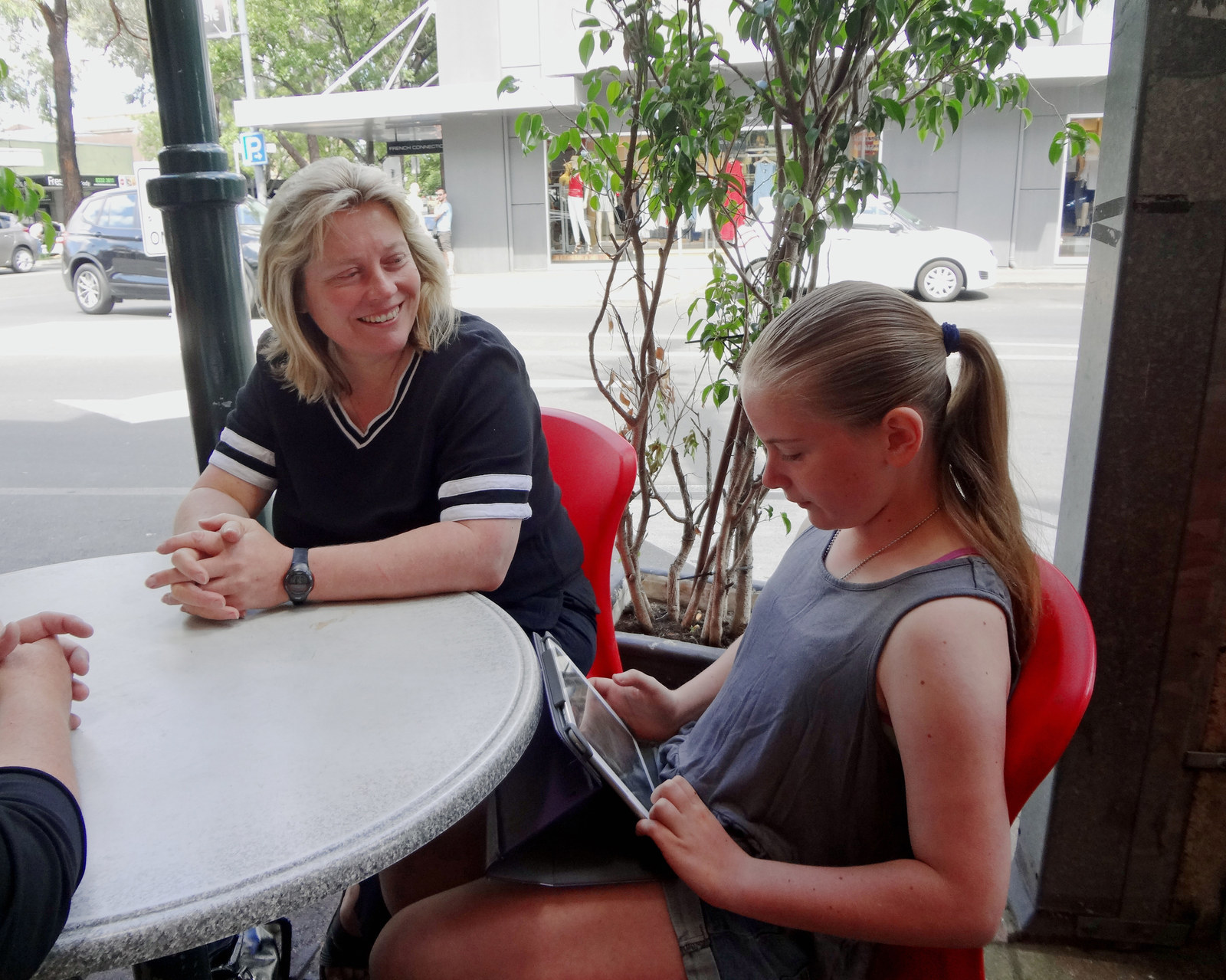
“I wouldn’t put it past certain people to at least try and pursue some kind of claim,” Katherine explains. “I’m not fearful that Jasmine would ever be taken away, but if something happened to Sharon, having to go through that process is something we’d like to avoid. We don’t want to put her through that.”
“Touch wood” – Katherine raps the table twice – “nothing like that will ever happen. But it’s all about protecting for the things you don’t want to think about.”
For South Australian same-sex couples who use IVF, it can be an expensive, difficult path.
Helen and Denise have been together for twelve and a half years. When they first decided to start a family, the plan was to do a home insemination, and just use an IVF clinic for sperm storage.
Quickly finding out they weren't eligible to use clinics in South Australia as they weren't "medically infertile", the couple opted to travel to Melbourne, where they discovered their donor had fertility issues and were advised to undergo the full IVF process.
This meant adding flights and accommodation to the already-expensive treatment – and brought up some medical issues, too.
“The first cycle that I did, the doctors were relying on information from scans I had had in Adelaide, some of which weren’t by IVF specialists,” explains Helen. “They weren’t too sure on what they were looking for.”
“My first cycle, we only got two eggs and one wasn’t as good. The doctor said if I’d been in Melbourne she would have seen me halfway through and said ‘we need to up the dosage, we need to change things to have a better success rate’. So we had to do two fresh IVF cycles, which at that stage was $8000 for a fresh cycle.”
“And it was surgery for Helen twice, as well,” adds Denise.
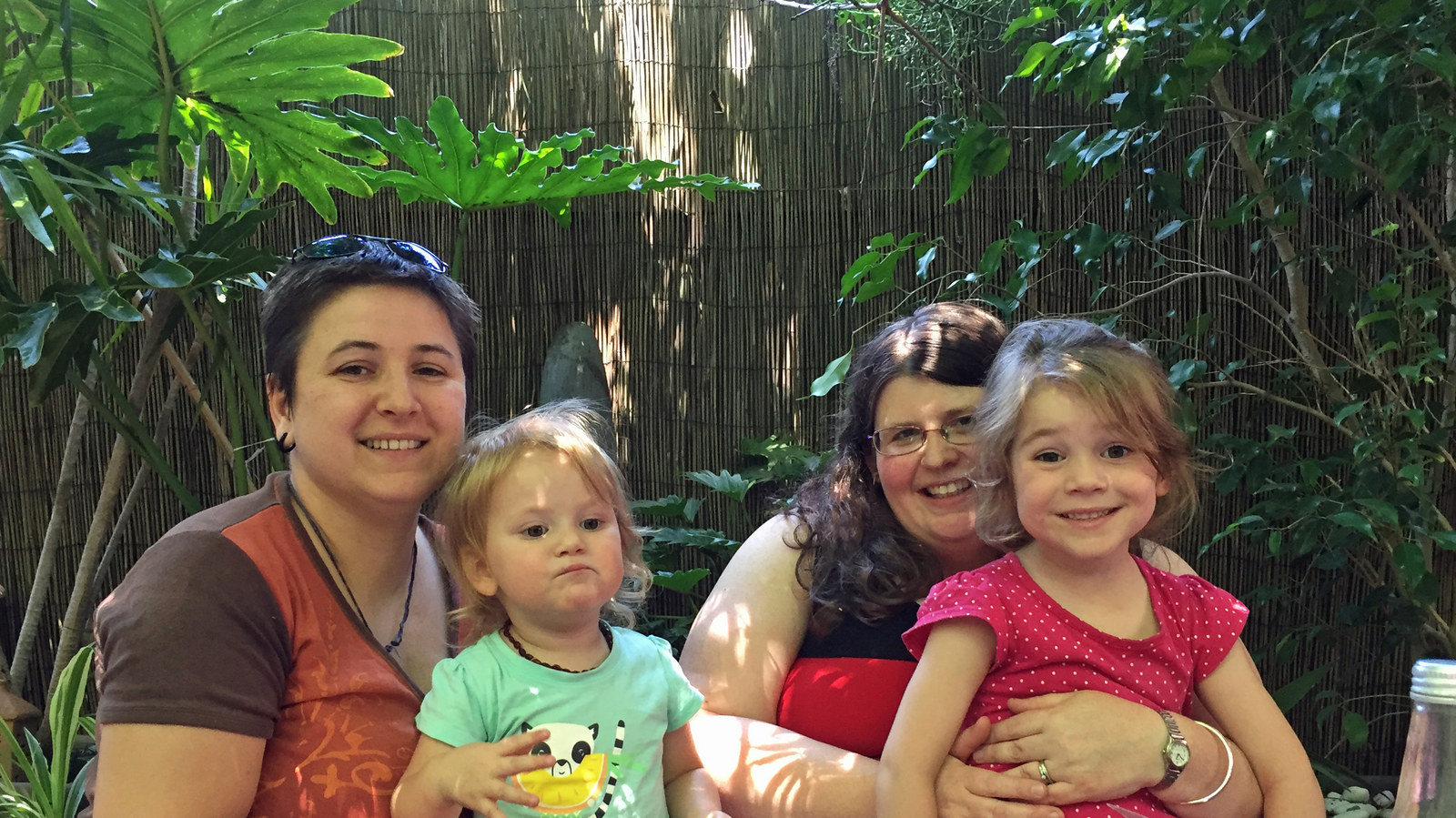
But despite the difficulties of having kids, Helen and Denise "couldn't be without them".
Claudia and Annika are wrangling with a plate of wedges while we talk. First they’re too hot, then a flailing elbow is accidentally dipped in the accompanying sauce.
“This is well behaved,” Helen says wryly.
The difference between being “medically infertile” and “socially infertile” – a phrase that makes all three couples interviewed wince and laugh – is a line that’s been badly drawn by the government, Denise says.
“We had medical infertility [in their donor] and it didn’t count,” she says. “I think the assumption is that if you’re a gay couple and you use IVF you want it to be anonymous, you don’t want anything to do with the donor. But we’re involved with the donor, he sees the girls, his family is involved with the girls.”
Throughout the entire spiel, Claudia is saying “Mum! Mum!” at an increasing volume. Once Denise is finished, she turns to her.
“What is it, darling?”
“At playgroup today there was a dead bird.”
“Thank you, honey,” Denise says. “Thank you for telling me that.”
At the very same playgroup that bird met its demise, same-sex couples often lament South Australia’s restrictive laws.
“Quite often we complain about various laws in regards to IVF, birth certificates, all that stuff,” says Denise.
"It's not stopping people like us from having children or raising children. It’s just putting us to extra effort, and doctors to extra effort. It’s not stopping us."
Across South Australia, staff in IVF clinics, doctors’ surgeries and at BDM are largely sympathetic to same-sex couples. All couples interviewed by BuzzFeed News reported being widely accepted in their communities, schools and workplaces, too.
So why is South Australia lagging behind other states on parenting reform? Well, politics.
A 2010 parliamentary report from the Social Development Committee recommended reform on every facet of same-sex parenting – same-sex adoption, altruistic surrogacy, restrictions on IVF and the three year catch in presumption of parentage.
But the Labor government, in power since 2002, is reluctant to make votes on same-sex parenting government policy – meaning bills for reform are left to be pushed through in limited private members time. They often don’t make it to a vote.
“That’s because we’ve got the right of the Labor party who are conservative, religious, Christian, drive the whipping and decide what gets on the agenda in negotiation with the Liberals,” Greens MLC Tammy Franks tells BuzzFeed News.
The intricacies of bureaucracy lead to constant misunderstandings as well. Many politicians are not particularly well versed in LGBTI issues and policy, and trying to pass policy like this is tiring.
“Members find it difficult to debate these issues because they actually have to think for themselves and do their own research,” says Franks.
“They’re not told by their party, given a briefing by their party on the pros and cons necessarily. Sometimes they are. Sometimes a member will go and brief their party room on it, but only an active member will do that."
"All of that work to brief people and then actually get it debated... that’s why things just don’t get through our lower house that in any way have to do with sexuality."
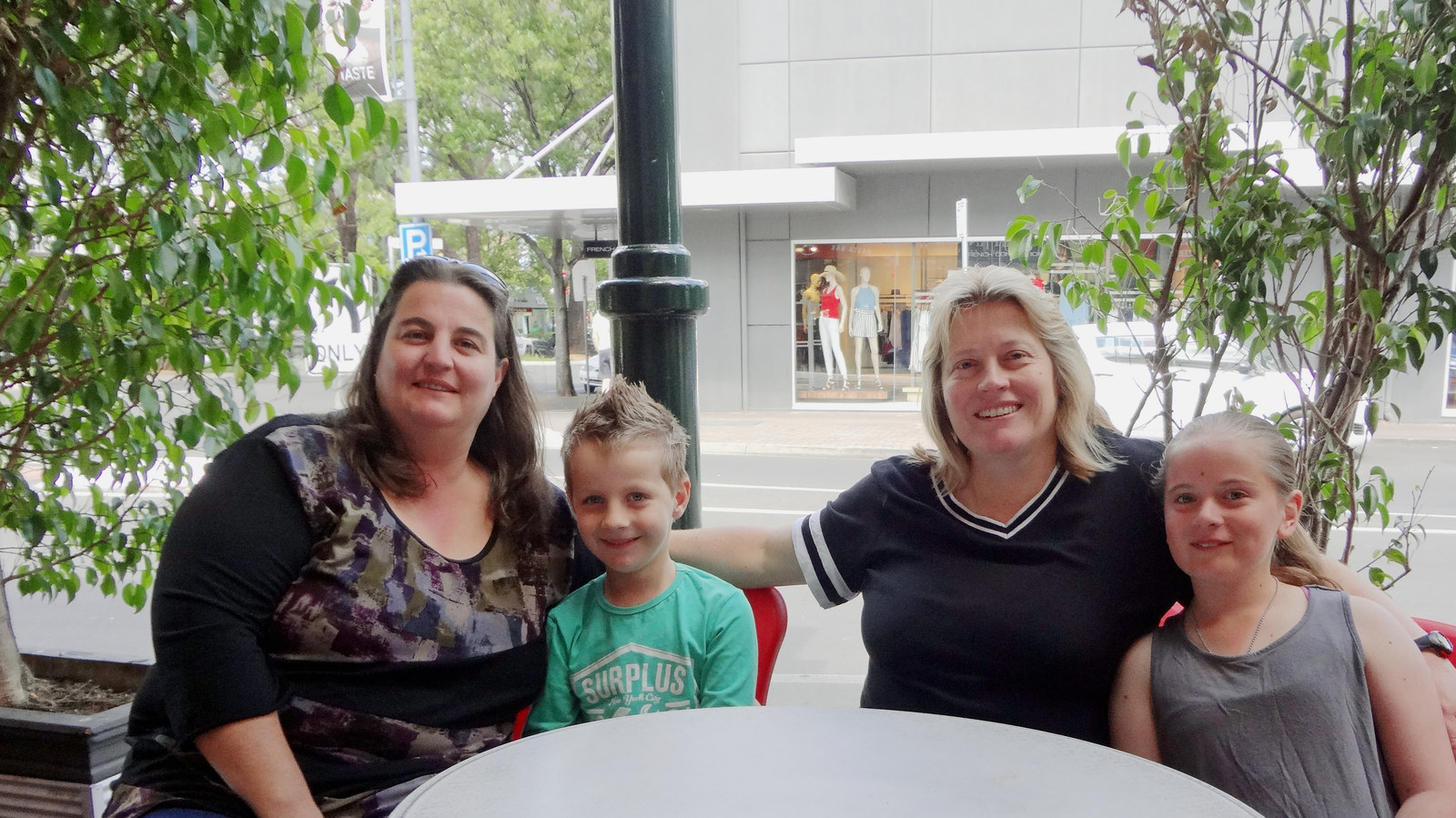
To combat the legally disjointed nature of their family, the Taylors made an unusual choice in 2009, just before Eli was born: they changed all of their surnames.
“Jasmine had a massive hyphenated name,” Sharon explains.
“And Sharon had gone through her whole life spelling her [surname] out. There were variations of mine too,” says Katherine.
They thought about it, spoke to then five-year-old Jasmine, and then just chose one. A new, simpler name.
“Taylor,” says Katherine. “Just the normal way.”
Given our attachment to our surnames – and the ongoing debate among heterosexual couples as to who should take who’s name – the Taylors' choice might be seen as unusual. But, Katherine explains, when there’s legislation keeping your family apart, something like having the same name can be a unifying, even calming, factor.
“To be brutally honest, I think that’s been one of the biggest things that’s given us an identity of family within the community,” she says. “We’ve all got the same name. When it comes to schooling, filling out forms, going to sporting things.”
“It’s just sucky that it comes at a cost,” says Sharon.
“Yeah, it cost us 600 bucks.”
“Five billion dollars!” yells Eli with glee. He’s chided gently with a “relax, dude” from Katherine. Jasmine is tapping away on the iPad.
“So that’s when you became the Taylors?”
“Yep,” says Sharon. “Here we come.”
